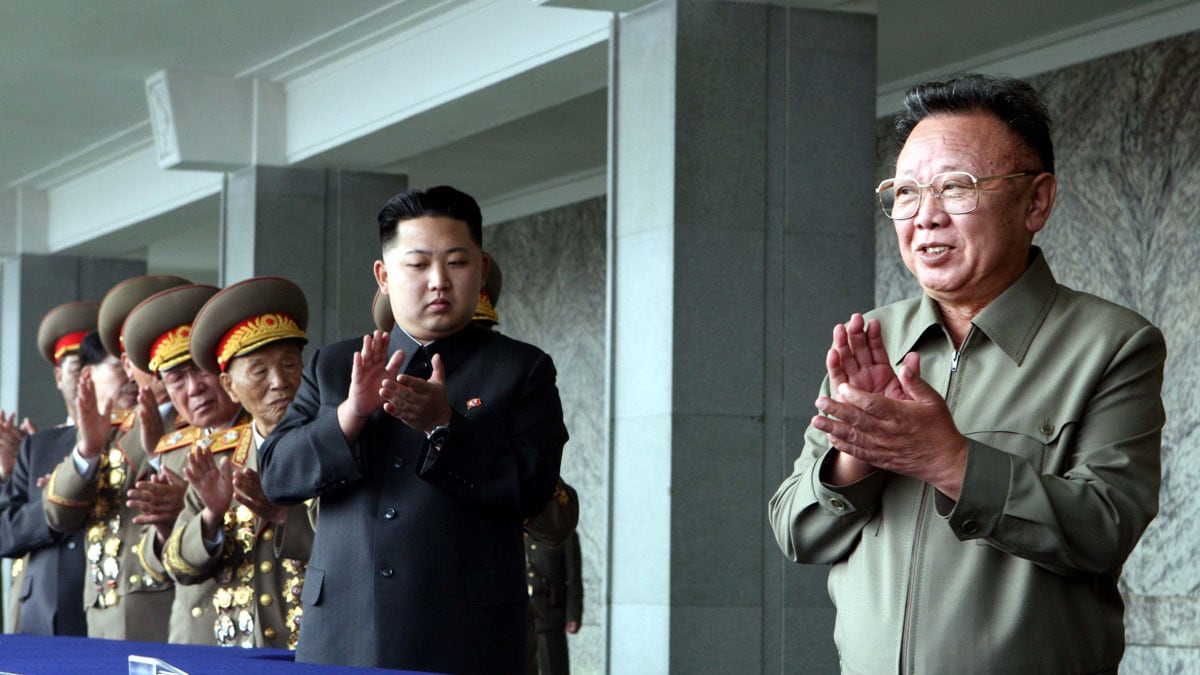News of Kim Jong-Il’s death has triggered plunging Asian markets, scenes of weeping North Korean TV announcers, and deep angst in regional capitals. The psyche of the Pyongyang regime is perhaps the most opaque in the world—and few governments will be scrutinizing North Korean news more intensely than China’s.
The problem is not only that so little is known about what Kim’s official successor, third son Kim Jong-un, has in mind for North Korea’s future directions. The future seems even more puzzling and ambiguous than it was under the “Dear Leader,” who was infamously secretive. Kim Jong-il loathed international trips and shunned flying in favor of traveling by train. North Korean media reported that Kim died of a massive heart attack Saturday while riding a train en route to a military garrison. (Informed diplomats in Beijing say one reason the late Kim preferred train travel was his obsession with preventing anyone but his own trusted aides from gaining access to his feces and other sources of DNA, since he believed the CIA was intent on obtaining his DNA for genetic analysis and other nefarious purposes.)
With his bouffant hairdo, platform shoes, penchant for blonde prostitutes, and love of Rambo and James Bond flicks, Kim Jong-il could easily be dismissed as an Oriental buffoon—except that he was a erratic and often aggressive buffoon with his finger on the nuclear button. As the brooding North Korean embassy in Beijing lowered its national flag Monday, Chinese officials (ever worried about stability) are fretting over whether the North Korean regime will be a stable, predictable ally and neighbor after Kim Jong-il. China fears an uncontrolled influx of North Korean refugees over the two countries’ border, or a miscalculation on Pyongyang’s behalf that might trigger actual conflict on the Korean peninsula—and even the possibility of a race between Chinese and South Korean troops toward Pyongyang should all hell break loose and unrest erupt uncontrollably in the North Korean capital.
Pyongyang has always been unpredictable; privately Chinese officials have characterized North Koreans as “impoverished and truculent.” In recent months, North Korea had reversed course on its characteristic belligerence, and was seeking to reengage diplomatically with Washington, making conciliatory noises toward the U.S. and apparently trying to restart the six-party talks that are intended to lead to denuclearization of the Korean peninsula.

The answers to “whither post-Kim North Korea?” lie not only in Pyongyang but also in Beijing. North Korea depends on China for more than three fifths of its total energy supplies, crucial food exports, and access to a banking infrastructure for much of its financial transactions. In addition, the isolated and notoriously volatile Pyongyang regime relies on Beijing as its most important ally and as a sort of “diplomatic handler” in North Korea’s interactions with the international community.
China has been the main mover behind the six-party talks, aimed at convincing North Korea to dismantle its nuclear program. Yet half a decade ago senior Chinese foreign-policy expert Zhang Liangui declared that Chinese diplomacy “has been a failure” in trying to bring about Pyongyang’s denuclearization. In a controversial departure from official policy, Zhang, an analyst at the influential Central Party School, called on Beijing to take a “moral stand” and try to compel Pyongyang to denuclearize by terminating its oil shipments to North Korea, which amounted to about 11,000 barrels daily.
Around the same time, influential Chinese analysts accelerated discussions about the possibility of a Beijing-friendly palace coup in Pyongyang. They reasoned that Chinese interests would be best served if Kim were succeeded by Sinophile military officers and technocrats who believe that Chinese-style economic reforms are North Korea’s best bet for the future, according to a former U.S. Pentagon official who requested anonymity because of the sensitivity of the topic. A number of senior North Korean defectors have been passing through—and living in—China for at least a decade and could provide a potential human-resources pool for a pro-Beijing regime.
At least some Chinese officials reportedly came to accept the prospect of Pyongyang’s demise and the reunification of the Koreas under Seoul’s auspices, according to WikiLeaks revelations citing a conversation between American ambassador to South Korea Kathleen Stephens and South Korea’s then-presidential security adviser Chun Yung-woo. Chun reportedly told Stephens in February 2010 that Beijing could accept “a reunified Korea controlled by Seoul and anchored to the U.S. in a ‘benign alliance’ as long as Korea was not hostile towards China.”
But Chinese analysts caution that the WikiLeaks report may have been a distortion of China’s policies—and more indicative of hawkish South Korean wishful thinking. (“The complete opposite of Chinese policy,” is how Renmin University analyst Shi Yinhong put it.) Even so, over the past year, many South Korean analysts have been predicting that Kim Jong-il’s time was drawing to an end—and that Pyongyang might collapse in April 2012, the month marking the 100th anniversary of the birth of Kim Il-sung, founder of the country and father of Kim Jong-il.
Ultimately, the Dear Leader’s end came sooner than expected. Even in the timing of his death, he proved he could still confound the Pyongyang watchers of the world.





